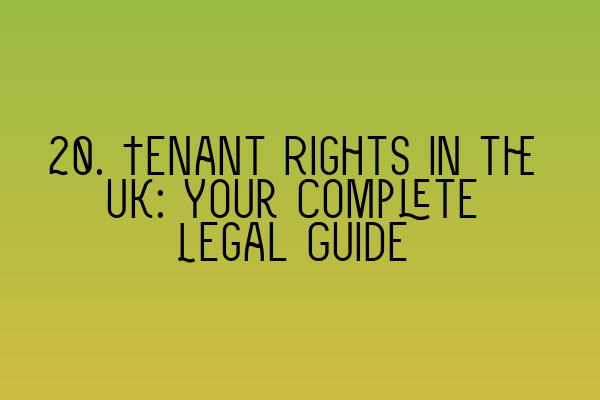Tenant Rights in the UK: Your Complete Legal Guide
Welcome to SQE Property Law & Land Law! As experts in property law, we understand the importance of knowing your rights as a tenant in the UK. Whether you are a long-term renter or considering renting a property, it is vital to be aware of the legal protections in place to ensure a smooth and fair tenancy. In this comprehensive guide, we will walk you through the key tenant rights you should be familiar with. Let’s dive in!
1. Right to a Written Agreement
One of the most fundamental rights you have as a tenant is the right to a written tenancy agreement. This agreement, also known as a lease, outlines the terms and conditions of your tenancy, including the rent amount, the duration of the tenancy, and any rights and responsibilities of both parties. It is essential to carefully review and understand this document before signing it.
For more information on understanding a tenancy agreement, take a look at our related article: SQE 1 Practice Mocks FLK1 FLK2
2. Right to a Safe and Habitable Property
As a tenant, you have the right to live in a safe and habitable property. This means that your landlord is responsible for ensuring that the property meets certain health and safety standards. This includes maintaining the structural integrity of the property, providing functional heating and ventilation systems, and ensuring the property is free from hazards.
If you believe that your rented property is not meeting these standards, it is important to reach out to your landlord or property management company to address the issue. If they fail to take the necessary actions, you may have legal recourse.
3. Right to Privacy
Your right to privacy as a tenant is protected by law. This means that your landlord cannot enter your rented property without proper notice except under specific circumstances, such as emergency repairs. Your landlord must provide you with reasonable notice, usually 24 hours, before entering the property for any non-emergency purposes.
4. Right to Quiet Enjoyment
The right to quiet enjoyment ensures that you, as a tenant, have the right to live in your rented property without any disturbance or interference from your landlord. This includes the right to live peacefully, without unnecessary interruptions, such as frequent and unannounced visits from the landlord.
If your landlord is infringing upon your right to quiet enjoyment, it is crucial to address the issue and communicate with them to find a resolution. In extreme cases, you may need to seek legal advice.
5. Right to Protection from Unfair Eviction
As a tenant, you have protection against unjust eviction. Your landlord cannot evict you without following the proper legal procedures and providing a valid reason for eviction, such as non-payment of rent or breach of contract. It is essential to be aware of your rights and consult a legal professional if you believe you are facing an unfair eviction.
To learn more about your rights regarding eviction, check out our related article: SRA SQE Exam Dates
6. Right to Challenge Rent Increases
If you are faced with a rent increase that you believe is unreasonable, you have the right to challenge it. Your landlord must provide a valid reason for the increase and follow the proper legal procedures. If you feel that the proposed rent increase is excessive or unjustified, you can seek advice from a housing charity or consult a professional solicitor.
7. Right to Protection from Unlawful Discrimination
The Equality Act 2010 protects tenants from unlawful discrimination. Landlords are prohibited from discriminating against tenants on the basis of characteristics such as race, religion, gender, disability, sexual orientation, or age. If you believe you have been the victim of discrimination, it is important to seek legal advice and report the matter to the appropriate authorities.
8. Right to Receive a Deposit Protection Scheme
If you have paid a security deposit for your rented property, it must be protected in a government-approved deposit protection scheme. This protects your deposit and ensures that you have access to it at the end of your tenancy, provided you have fulfilled your obligations as a tenant.
9. Right to Fair Treatment and Repairs
Your landlord has a legal obligation to carry out necessary repairs and maintenance in a timely manner. If there are any issues with the property that affect your safety or the enjoyment of the property, it is essential to report them to your landlord in writing. They have a duty to address these issues promptly.
For more information on understanding your responsibilities as a tenant, take a look at our related article: SQE 1 Practice Exam Questions
10. Right to Recover Overpaid Rent
If you have mistakenly overpaid rent, you have the right to request a refund from your landlord. They are legally obligated to return any excess rent that you have paid. Make sure to keep a record of your rental payments and contact your landlord to rectify the situation.
We hope this guide has provided you with valuable insights into your tenant rights in the UK. Remember, it is essential to familiarize yourself with the specific laws and regulations in your area and seek legal advice if needed.
If you are looking for comprehensive preparation courses for the SQE exams, we offer SQE 1 and SQE 2 preparation courses. Check out our website for more information:
